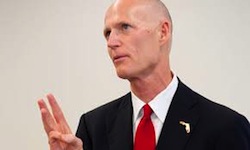I’ve never been a fan of former hospital executive Rick Scott, but he did the right thing last month in making the decision as Republican governor of Florida to expand Medicaid. His campaign three years ago was based on his opposition to the Affordable Care Act, so his hard-right supporters have since vilified him as a traitor, despite his saying the recent death of his mother made him realize having health care is important to people.
 Scott is a shrewd businessman. In 2010 his net worth, before spending $75 million on his campaign for governor, was almost $219 million. He knows that the federal government will pay 100 percent of the cost of caring for newly eligible Medicaid enrollees for the first three years and will continue to pay no less than 90 percent of the cost in subsequent years. By spending $3 billion over the next 10 years, Florida stands to gain $26 billion in federal Medicaid money. He said it’s too good a deal to pass up, especially since that money would go to other states.
Scott is a shrewd businessman. In 2010 his net worth, before spending $75 million on his campaign for governor, was almost $219 million. He knows that the federal government will pay 100 percent of the cost of caring for newly eligible Medicaid enrollees for the first three years and will continue to pay no less than 90 percent of the cost in subsequent years. By spending $3 billion over the next 10 years, Florida stands to gain $26 billion in federal Medicaid money. He said it’s too good a deal to pass up, especially since that money would go to other states.
In the 1980s, he saw a wasteful, overbuilt hospital industry and purchased two struggling hospitals in El Paso. Within a few years he turned it into the largest health care company in the world, Columbia/HCA.
But at its peak in March 1997, Scott’s $20 billion colossus was the subject of a huge FBI investigation, and his in-your-face response prompted his own board of directors to fire him in July 1997. The inquiry found systematic and fraudulent overbilling of the government. HCA paid more than $2 billion, at the time by far the largest fraud settlement in U.S. history.
Meanwhile, in 1994, Seton, St. David’s and Brackenridge, as freestanding independent hospitals, were shaking in our collective boots as the thousand-pound Godzilla that was Columbia/HCA shook the ground beneath us with each approaching step. We radically realigned to take advantage of economies of scale.
Today, the Seton Healthcare Family operates more than 90 clinical locations including five major medical centers, two community hospitals, three rural hospitals, an inpatient mental health hospital, three primary care clinics for the uninsured and several strategically located health facilities. St. David’s HealthCare operates six hospitals, four ambulatory surgery centers and 12 outpatient sites. HCA owns a majority stake in the St. David’s system, partnering with the St. David’s Foundation, which gives generously of its community assets to community health care needs such as mental health and children’s dental care.
Scott could have changed his mind because:
• His approval rating hovers in the 30 percentile;
• Obama won Florida;
• Before the election, the U.S. Supreme Court upheld the health care law;
• Governors nationwide are getting pressured by the hospital industry that is covering uninsured health costs; and
• Those same governors also get pressure from religious leaders and others who think providing health care is a moral obligation.
Twenty-four states have agreed to expand Medicaid, and Scott joins the Republican governors of Arizona, Michigan, Nevada, New Jersey, New Mexico, North Dakota and Ohio to do so.
Beyond economics, lives are at stake. A 2012 New England Journal of Medicine study showed that states that expanded Medicaid saw a 6.1 percent reduction in the death rate among adults younger than 65 who qualified for the program. Dr. Howard Brody, director of the Institute for Medical Humanities at the University of Texas Medical Branch at Galveston, did the math for an opinion piece published recently in the Galveston Daily News. Brody wrote that translates to 9,000 Texans dying each year by failing to expand Medicaid.
For investing $15 billion in 10 years, Texas could draw down $100 billion in federal funds that would provide health care to 2 million Texans. The Perryman Group, an economic analysis firm, projects that for every $1 spent for expansion, Texas will realize a $1.29 return on investment. Billy Hamilton, the state’s former chief revenue estimator, recently reported that Texas’s Medicaid expansion match would be offset many times over. From 2014 to 2017, the total goods and services produced in Texas would be boosted by $67 billion. An additional 231,000 jobs would be generated by 2016. The huge financial hit sustained by state and local hospitals and governments would be greatly reduced.
Rick Scott, the businessman/governor, can count. Let’s hope Rick Perry, the governor who talks up business, will also do the math.

 Austin, Texas
Austin, Texas